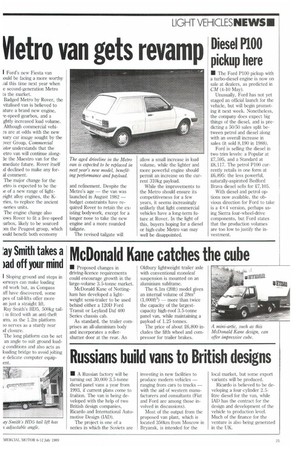liletro van gets revamp Diesel P/00
Page 23

If you've noticed an error in this article please click here to report it so we can fix it.
pickup here
I Ford's new Fiesta van lould be facing a more worthy ial this time next year when e second-generation Metro ts the market.
Badged Metro by Rover, the vitalised van is believed to ature a brand new engine, re-speed gearbox, and a Ightly increased load volume. Although commercial vehin are at odds with the new 'airy car image sought by the pver Group, Commercial 'otor understands that the etro van will continue alongle the Maestro van for the 'mediate future. Rover itself id declined to make any fora] comment.
The major change for the etro is expected to be the e of a new range of lighteight alloy engines, the Kries, to replace the ancient -series units.
The engine change also Lows Rover to fit a five-speed iarbox, likely to be sourced Dm the Peugeot group, which lould benefit both economy and refinement. Despite the Metro's age — the van was launched in August 1982 — budget constraints have required Rover to retain the existing bodywork, except for a longer nose to take the new engine and a more rounded tailgate.
The revised tailgate will allow a small increase in load volume, while the lighter and more powerful engine should permit an increase on the current 310kg payload.
While the improvements to the Metro should ensure its competitiveness for a few years, it seems increasingly unlikely that light commercial vehicles have a long-term future at Rover. In the light of this, buyers hoping for a diesel or high-cube Metro van may well be disappointed.




















































































































